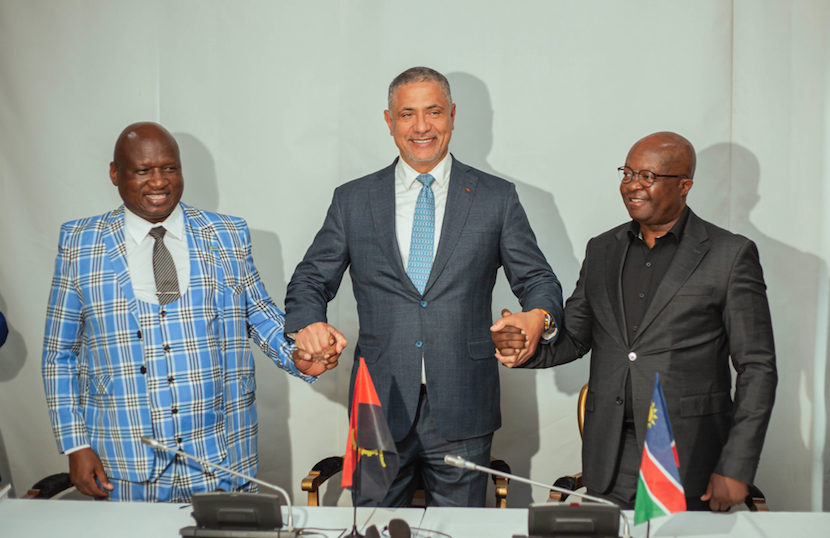- Home
- About Us
- Background
- Mandate
- Cubango Okavango River Basin
- Governance
- Strategy and Approach
- Member States
- Our Work
- Partners
- Climate Resilient Infrastructure Development Facility (CRIDF)
- European Union (EU)
- Southern African Development Community (SADC)
- Swedish International Development Cooperation Agency (SIDA)
- The World Bank (WB)
- United Nations Development Programme (UNDP)
- United States Agency For International Development (USAID)
- Resources
- News and Events
- Opportunities
- Contact Us
- FAQ's
- Connect With Us
- i
- t
- f

Ministers Sign the Revised OKACOM Agreement
Thursday, March 20, 2025

The Ministers responsible for water from Angola, Botswana and Namibia have signed the revised Permanent Okavango River Basin Water Commission (OKACOM) Agreement during the 30th Anniversary Celebrations of OKACOM on 14 March 2025 in Lubango Angola. Held in conjunction with the Ministry of Energy and Water (MINEA) of Angola, and was held under the theme “Angola, Botswana, and Namibia Celebrating 30 Years of promoting sustainable development in the Cubango-Okavango River Basin through OKACOM”. The event brought together OKACOM stakeholders to consider the successes, challenges, and lessons learned overtime. This is in order to develop fresh perspectives for revitalized and refocused river basin management of the transboundary Cubango-Okavango River Basin (CORB) which is a vital ecological and hydrological region in Southern Africa, known for its unique ecosystems and biodiversity.
“This revised Agreement will replace the current Agreement, which was signed in 1994, before a number of significant international and regional water cooperation instrument were signed such at the 1995 SADC Protocol on Shared Watercourse Systems, The UN Water Convention on the Non-Navigational Uses on Shared Watercourses, it has thus, now incorporated the principles and critical provisions that were not known then and which came later with these instruments”, said Phera Ramoeli, the OKACOM Executive Secretary.
The OKACOM Agreement initially signed in 1994 commits the Member States of Angola, Botswana and Namibia who jointly share the water resources of the CORB to promote coordinated and environmentally sustainable regional water resources development. This is done while addressing the legitimate social and economic needs of each of the riparian states. Currently, the Basin is facing increasing external and internal pressures such as poverty, population growth, changes in development patterns, growing infrastructure requirements and climate change. One of the key findings from a 2018 Discussion Paper of the 1994 Agreement is that it was no longer fit for purpose, necessitating revisions that reflect regional and international trends and developments in transboundary water resources management and governance.
A review was carried out during 2021 through a strategic consultative and participatory approach which included desktop review comprising a contextual assessment of the CORB, an analysis of contemporary international water law issues and benchmarking against other River Basin Organisations. A draft revised Agreement was developed from these consultations, and with the next steps being for Member States to discuss, negotiate, and finalize the Agreement, which culminated with the signing of the revised Agreement by the three Member States.
“The Agreement in summary is for us to create the conditions to further streamline our actions, set objectives for the future, and determine the way forward. Essentially, it is a set of conditions that each of the members of this commission, each of the countries, subscribe and, above all, it is a collective commitment.” stated Honourable João Baptista Borges, Minister of Energy and Water of the Republic of Angola.
“Today the signing of the Revised OKACOM Agreement is a commitment to continue our cooperation which we have enjoyed in the past 30 years. The revised OKACOM agreement aligns with international and regional frameworks, and this will allow better management of our resource. I must say I am happy with the signing of the agreement. It clearly shows our friendship as the three countries. It shows our commitment to the improvement of the livelihoods of our people’ stated Honourable Onneetse Ramogapi, Minister of Water and Human Settlement of the Republic of Botswana
“The signing of the revised OKACOM Agreement ensures the continued cooperation between Member States, but a more holistic way since this Agreement is making provision for the expanded mandate of the Commission. The cooperation will now shift from focusing on the surface and ground-water dynamics of the Okavango River only and to be inclusive of the socio-economic wellbeing of communities along the river”, stated Honourable Obeth Kandjoze, Director General of the National Planning Commission of the Republic of Namibia.
Thematic Areas & Activities
News
subscribe for news notification by email
Photo Credit: Kostatin Luchansky, National Geographic, Okavango Wilderness Project.
© [current-date:custom:Y] [site:name]

